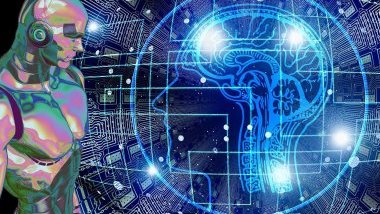“Whoever masters AI will rule the world!” – with these words, Russian President Vladimir Putin mapped out the dimension of this new technology. Many fears and hopes come along with artificial intelligence. Mentioning AI, many think of “Terminator”, HAL 900 from “A Space Odyssey” or E.M. Foster’s “The Machine Stops”. Briefly, AI is perceived as something super-intelligent, superior to the human mind.
It is important to understand first what artificial intelligence actually means. It is often described as the new Industrial Revolution, the second Machine Age. Contrary to the first Industrial Revolution, however, machines won’t replace muscle power but the power of thought. Put differently, the new machines learn from what they do and thereby become better at it. Unlike during the first Industrial Revolution, this change will also affect highly qualified people. The Job-Futuromat platform, designed by researchers at the Institute for Employment Research in Nuremberg, shows which jobs might be taken over by robots in the future.
The European Economic and Social Committee identified eleven areas where the technological upheaval will have significant consequences for society. These include questions of employment, democracy and – due to autonomous weapon systems – even questions of war and peace. Especially with regard to this potential, states like China have a great interest in becoming the global leader in AI. The European Union responded with its own approach to this topic. Its strategy can be divided into three areas: technological, social, and ethical considerations.
Artificial intelligence needs intelligent investments
One thing is already becoming clear today: AI is a growing market of the future. Whilst in Asia nearly €10 billion and up to €20 billion in North America are invested in AI research, Europe lags behind with a budget of €3.2 billion. That is why the European Commission plans to invest an additional €1.5bn through its Horizon 2020 programme. Together with existing public-private partnerships and Member States’ national programmes, the available research budget is expected to be stepped up to €20bn.
Especially small and medium-sized enterprises struggle to access the possibilities of AI. Hence, the Commission plans an “AI on demand” platform, making a number of recent algorithms publicly available. Moreover, programmers will have better access to public data for scientific, social, and economic purposes. All this will be in combination with the setup of “AI Digital Innovation Hubs”, in which entrepreneurs will receive direct consultation on the deployment of AI systems.
Digitalisation leans on a social pillar
Although digitalisation will affect all areas of the labour market, 44% of all European citizens do not have basic digital skills. According to the targets of the European Pillar of Social Rights, “everyone has the right to quality and inclusive education, training and life-long learning on order to maintain and acquire skills that enable them to participate fully in society and manage successfully transitions in the labour market.” (Article 1).
In line with the New Skills Agenda, the Digital Skills and Job Coalition brings together Member States, companies, social partners, NGOs and education facilities to counteract the lack of digital education in Europe. The target of this coalition is to help over a million young jobseekers into employment. Likewise, the Digital Opportunity Traineeship allows young graduates to obtain digital qualifications. Additionally, employees of all kinds will be provided training on the challenges of the digital revolution. Outstanding projects in this area will be honoured with the Digital Skills Award.
Digitalisation is an ethical question
Algorithms can process data – in other words, information – but only humans can interpret and validate these. The “Social Scoring System” in China exemplifies how important it is to consider ethical questions that arise with the use of technology. The use of AI alone does not mean that a decision is also intelligent.
Regarding the possibilities of artificial intelligence, the ethical and responsible usage of this technology is decisive. In Austria, for example, AI systems are already in use with regard to job placement services. The AI strategy of the European Union stresses that the use of AI applications has to comply with ethical and legal standards. This especially implies establishing general awareness and understanding of the use of algorithm-based systems. The aim is to create an ethical code, a code of conduct, for the use of AI systems. This code is based upon the principles of transparency, comprehensibility, monitorability and accountability.
Many people are worried, even fearful of the possibilities of artificial intelligence. The European Union High Level Expert Group on AI hence pleads for trustworthy AI that a) meets ethical standards and respects basic rights, and b) is technically robust and reliable for doing the job it is designed for.
This is expressed in five guiding principles: AI systems should always be created for individual and collective wellbeing (Principle of Beneficence). They shall not harm anyone, human rights must be respected, and democratic processes shall never be jeopardized, for instance, by interference (Principle of Non-Maleficence). The autonomy of all people to take decisions must be protected, including refusal to use AI (Principle of Autonomy). Minorities must be protected against discrimination and stigmatisation by an objective data basis (Principle of Justice). Finally, the use and the decision-making process of AI systems must always be transparent and traceable (Principle of Transparency).
Artificial intelligence needs healthy common sense
Artificial intelligence is made of learning systems which, by doing what they do, learn how to do it better. That in turn means that the great potential of AI systems also means great responsibility for humans to handle these new possibilities.
Stephen Hawking once said, “The greatest enemy of knowledge is not ignorance; it is the illusion of knowledge.” What matters is for humans, and not machines, to make the decision on which kind of a digital society we want to live in.
Machines cannot help us with this fundamental aspect – as Pablo Picasso once put it: “Computers are useless. They can only give you answers.” It is up to each and every one of us to have a say on how we want to make the most of these technologies for the benefit of all mankind in the future. Artificial intelligence does mean great opportunities, but also human responsibility to use it wisely. In other words: The only ‘remedy’ against exuberant artificial intelligence is human stupidity. Because the latter is unpredictable.
Those who want to seize the opportunity and explore the world of AI, may check out the University of Helsinki’s free webinar “Elements of AI”.





Follow the comments: |
|
